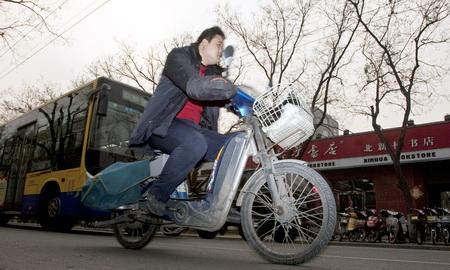
A man rides an electric bike in Beijing. Chinese government is reconsidering on restriction policy on such a motorcycle in downtown cities. [Agencies]
China backed down from a plan to reclassify large electric bicycles (e-bikes) as motorbikes last week, a move that threatened to put the brakes on a Chinese consumer craze.
The government had stirred widespread fears that more than 2,000 e-bike factories would close and millions of users would need to get licenses and insurance as motorbike riders do.
Increased production of e-bikes has driven demand for lead in China, the world's top consumer and producer of the metal used in batteries. Worries over e-bike production had spurred merchants to sell refined lead stock to the spot market, traders said.
China's Standardization Administration said it was rethinking the idea of reclassification.
Earlier this month, it said e-bikes that weighed more than 40 kg or that can go faster than 20 km per hour could be classified as electric motorbikes.
"This is good news," said an official at the China Bicycles Association. He added the industry body had lobbied the Standardization Administration to relax the standards for e-bikes following the threat.
The association was drafting standards for e-bikes and will submit them to the government, he said, without providing a timeframe for the submission and details of the proposed standards.
Top of the range e-bikes in China are designed to go as fast as 30 km per hour. The bikes usually carry four lead batteries, which weigh 16 to 28 kg.
Lead demand
State-backed research group Antaike estimated the production of e-bikes accounted for 26 percent of China's refined lead consumption at 2.9 million tons in 2008, just behind the car sector, which accounted for 28.5 percent.
The 2008 estimate suggests production of e-bikes used 754,000 tons of refined lead last year.
China, the world's top refined lead consumer and producer, is expected to consume 3.37 million tons of refined lead this year, Antaike estimated.
Chinese refined lead prices have risen 51 percent this year to 15,900 yuan ($2,329) per ton on Dec 15, behind a 130-percent rise in London Metal Exchange lead MPB3, which stood at $2,335 per ton on the same day.
Prices may rise further following the suspension of the e-bikes standards, because that could encourage factories to resume production and limit merchants' selling of lead stocks.
Falling concentrate supplies and looming holidays are also expected to cause production of refined lead to fall at least 20 percent in the next two months from November, smelter officials and analysts said.





